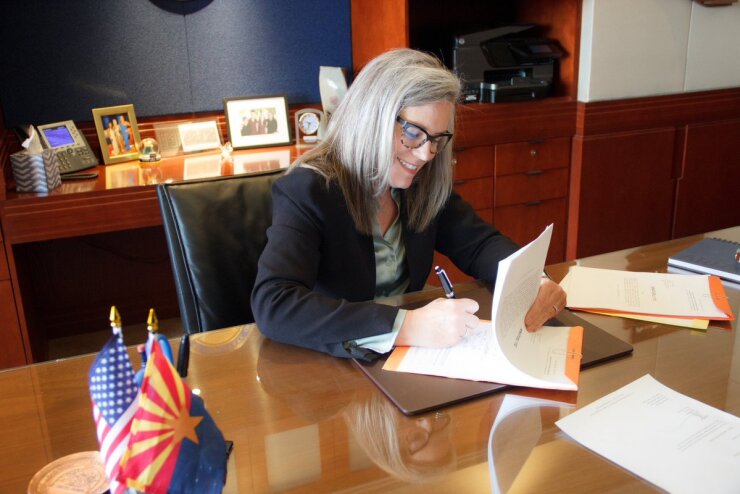An extension of a half-cent sales tax to fund transportation projects in Arizona's fast-growing Maricopa County will be up to voters in November 2024 after the governor last week signed a compromise bill into law.
The billions of dollars raised by the so-called Proposition 400 tax extension would flow to freeways, roads, and mass transit in and around Phoenix, but would be blocked from funding new light rail projects, which could lead local governments to pitch in more of their own money. Voter approval would also lift a cloud over a regional authority's bond rating.

Democratic Gov. Katie Hobbs, who vetoed a previous measure, hailed a bipartisan effort by the Republican-controlled legislature and others when
"With support spanning across political parties, businesses, workers and everyday Arizonans, Prop 400 will secure our economic future and give every Arizonan an opportunity to succeed in our thriving economy," she said in a statement.
Extending the tax, which expires Dec. 31, 2025, would generate nearly $15 billion over 20 years to support a $28 billion transportation program, according to the Maricopa Association of Governments.
"While Maricopa County is the only county that requires legislative approval to take an initiative to the ballot, we were resolute in ensuring that we put forward a plan that had the unanimous support of 32 cities, towns, counties, and native nations," Phoenix Mayor Kate Gallego, who also chairs MAG, said in a statement. "Though the current bill does not provide us with the flexibility we originally sought, it allows us to wholly implement our planned multimodal projects, setting the foundation for a stronger, more accessible region."
The tax
A first lien on one-third of the 0.5% countywide transportation excise tax backs bonds sold by the Regional Public Transportation Authority, which was created in 1985 to develop a regional transit system in Maricopa County, now home to more than 4.55 million people. More than 56,800 residents
The regional authority had $85.8 million of revenue bonds outstanding at the end of fiscal 2022 from issues sold in 2014, 2016, and 2019, according to its
The bonds are rated AA by Fitch Ratings and AA-plus by S&P Global Ratings.
Fitch
The tax raised $664.8 million in fiscal 2022, up from $559 million in fiscal 2021, according to the authority's audit, with 56.2% allocated to freeways, 33.3% to public transportation, and 10.5% to arterial streets.
Under the enacted SB 1102, 40.5% would go to freeways and highways, 37% to transit, 22.5% to roads and intersections, and 0% to light rail expansion.
Republican Senate President Warren Petersen said the bill will put "the most conservative transportation plan" in state history before voters.
"The guardrails, taxpayer protections and funding allocations in the text of this bill reflect the priorities of voters, to reinvest their tax dollars in the transportation modes they use most," he said in a statement. "We have eliminated regional funding for the expansion of light rail, commuter rails, trolleys, and streetcars."
Senate Democratic leader Denise "Mitzi" Epstein said infrastructure investment is desperately needed for economic development.
"Prop 400E will create $40 billion in new income, increase local business sales by $113 billion, reduce traffic congestion throughout the valley, and create or support 32,000 jobs annually," she said in a statement.
There was also bipartisan opposition to the bill when both legislative chambers passed the measure July 31.
"I am voting no on this bill because it puts limits on light rail and transit especially here in areas around the capitol and other areas in the city that would really help out poor people who don't drive on freeways because they don't own cars," Democratic State Sen. Sally Ann Gonzales said on the Senate floor. "They need transit and they need light rail to get to work."
Republican State Rep. Alexander Kolodin opposed the bill, citing its failure to include an option for voters to decrease the tax.
"A tax extension is a tax increase," he said on the House floor.
John Bullen, MAG's transportation funding policy program manager, said other funding sources besides the tax are available to address constraints contained in SB 1102.
"Within those funding sources, which include state revenue, federal matching funds, and local transit taxes, the region is still able to deliver the projects outlined in the plan, including light rail and other transit services," he said.
Phoenix plans to use existing county excise tax revenue along with the city's dedicated transportation sales tax and federal grants for a light rail extension to the state capitol, Ashley Patton, a city spokeswoman said.
"Future light rail extensions would need to use dedicated city transportation sales tax funds along with federal grants without county transportation funding," she said.
Goodyear, Arizona, is placing a $135 million bond issue on the November ballot to generate its local share for arterial road and other transportation projects, Deputy City Manager Andy Granger said.
The road to the ballot to extend the tax was a bumpy one.
A bill
In June, Hobbs
"I encourage legislators to vote on the compromise that is supported by a bipartisan majority in the House and Senate, community leaders, and cities in Maricopa County," she said in a statement. "Stop playing partisan politics, stop holding Arizona's economy hostage, and put the bipartisan compromise up for a vote."





